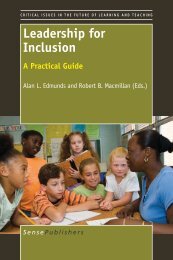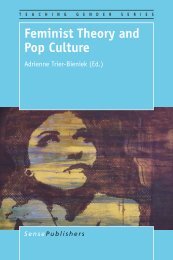DAVID PERKINSFOREWORDEntrance…<strong>and</strong> entrance. Am I repeating myself? Not if you listen really hard. Thefirst ‘entrance’ has the accent on the initial syllable <strong>and</strong> the second on the ultimate –EN-trance <strong>and</strong> en-TRANCE. Such pairs are called heteronyms, same spelling,different pronunciation. Both words trace their ancestry back to the Latin transire,to go across, albeit by quite different routes. And both words apply quite well tothe notion of <strong>threshold</strong> <strong>concepts</strong>, launched through seminal articles by Ray L<strong>and</strong>,Jan Meyer <strong>and</strong> their colleagues a few years ago <strong>and</strong> explored <strong>and</strong> extended here, aswell as in two previous volumes (L<strong>and</strong> et al 2005, L<strong>and</strong>, Meyer <strong>and</strong> Smith 2008,Meyer <strong>and</strong> L<strong>and</strong> 2003, 2005, 2006, 2009, Meyer, L<strong>and</strong> <strong>and</strong> Davies, 2008).Meaning 1: EN-trance. When learners acquire a <strong>threshold</strong> concept, they enterinto a new realm of underst<strong>and</strong>ing. Quick examples include the <strong>concepts</strong> of ‘limit’in mathematics, ‘gravity’ in physics, ‘depreciation’ in accounting, <strong>and</strong> ‘deconstruction’in literature. Innumerable other instances populate the chapters of this volume.Many of these transformative ideas are not <strong>concepts</strong> in any strict sense but variedways of thinking <strong>and</strong> practicing with a <strong>threshold</strong>-like nature, all of them affordingentrance in one sense or another.Meaning 2: en-TRANCE. This volume <strong>and</strong> its predecessors give ample evidencethat <strong>threshold</strong> <strong>concepts</strong> entrance -- they entrance scholars <strong>and</strong> teachers concernedwith the nature <strong>and</strong> challenges of <strong>learning</strong> in the disciplines. Discourse around<strong>threshold</strong> <strong>concepts</strong> has proven to offer something of a common language, provokereflection on the structure of disciplinary knowledge, <strong>and</strong> inspire investigations oflearners’ typical hangups <strong>and</strong> ways to help. Indeed, it’s been my pleasure to add tothis conversation from time to time on the theme of troublesome knowledge, thecharacteristic ways in which <strong>learning</strong> poses challenges (e.g. tacit knowledge,conceptually difficult knowledge, ritual knowledge) <strong>and</strong> the value of constructing"theories of difficulty" for the disciplines that chart where the cracks <strong>and</strong> chasms of<strong>learning</strong> lie <strong>and</strong> suggest ways of bridging them.So why the entrancement? What is it that so many educators have found alluringabout <strong>threshold</strong> <strong>concepts</strong>? One answer touched on in the upcoming introductionwas suggested by Glynis Cousin (2007) a couple of years ago – <strong>threshold</strong> <strong>concepts</strong>invite instructors to examine their disciplines rather than looking directly at theirteaching practice, both a more comfortable <strong>and</strong> a more interesting journey formany.Another related reason seems to be the very fecundity of <strong>threshold</strong> <strong>concepts</strong>, theevolutionary proclivity of the idea toward adventurous <strong>and</strong> fruitful mutation. As anoccasional participant in these conversations, I am always struck by howproductively imprecise the notion is.xliii
PERKINSPut the matter this way – Is ‘<strong>threshold</strong> concept’ itself an ideal <strong>threshold</strong> concept?For sure, it has brought many scholars to a new view of things. But a trulyprototypical <strong>threshold</strong> concept perfectly fills a critical slot in a mature homediscipline, as with the cases mentioned above. Novices may get confused <strong>and</strong>confounded, but not experts.In contrast, ‘<strong>threshold</strong> concept’ itself seems to have the heart of a nomad. In thechapters to come, it gets stretched, challenged, revised, reconsidered. Back to theevolutionary metaphor, consider today’s biological concept of a bird, preciselydemarcated by features such as feathers, toothless beak, hard shelled eggs, fourchambered heart, etc. All very neat! Now imagine a biologist roaming around inthe Jurassic, 150 to 200 million years ago. “Is this a bird?” the biologist asks. –“But it has teeth!” “Is that a bird? -- But those aren’t really feathers!” The diversitywas startling <strong>and</strong> the boundaries not yet formed when small theropod dinosaursfluttered across the <strong>threshold</strong> of flight into the new world of the air. Moreover,contemporary paleontology suggests that many of the features that today we takeas distinctive of birds developed before flight...including feathers.The flock of ideas around <strong>threshold</strong> <strong>concepts</strong> seems to me more analogous to thebird-like-creatures of yesteryear than to Aves of today, more exploratory <strong>and</strong>eclectic than categorical <strong>and</strong> taxonomic. All to the good! -- the richness of thisvolume testifies to that. So welcome to Jurassic Park! Here we are at the ENtrance.Prepare to be en-TRANCED.REFERENCESCousin, G. (2007). Exploring <strong>threshold</strong> <strong>concepts</strong> for linking teaching <strong>and</strong> research. Paper presented tothe International Colloquium: International Policies <strong>and</strong> Practices for Academic Enquiry, Winchester,April. Retrieved on 1 September 2008 from the World Wide Web: http://portal live.solent.ac.uk/university/rtconference/2007/resources/glynis_cousins.pdf.L<strong>and</strong>,R.,Cousin, G., Meyer, J.H.F. & Davies, P. (2005). Threshold <strong>concepts</strong> <strong>and</strong> troublesome knowledge (3):Implications for course design <strong>and</strong> evaluation. In C. Rust (Ed.), Improving Student Learning 12 –Diversity <strong>and</strong> Inclusivity. OCSLD, Oxford Brookes University, Oxford, 53-64. See http://www.brookes.ac.uk/services/ocsld/isl/isl2004/abstracts/conceptual_papers/l<strong>and</strong>.htmlL<strong>and</strong>, R. & Meyer, J.H.F. (2009). Threshold <strong>concepts</strong> <strong>and</strong> troublesome knowledge (5): Dynamics ofassessment. Chapter 4, this volume.L<strong>and</strong>, R., Meyer, J.H.F <strong>and</strong> Smith,J. (Eds) (2008) Threshold Concepts Within the Disciplines. Rotterdam:Sense.Meyer, J.H.F. & L<strong>and</strong>, R. (2003). Threshold <strong>concepts</strong> <strong>and</strong> troublesome knowledge: Linkages to ways ofthinking <strong>and</strong> practising within the disciplines. This seminal paper was published electronically (seehttp://www.tla.ed.ac.uk/etl/docs/ETLreport4.pdf) <strong>and</strong> was later republished as a book chapter:Meyer, J.H.F. & L<strong>and</strong>, R. (2003). Threshold <strong>concepts</strong> <strong>and</strong> troublesome knowledge: Linkages toways of thinking <strong>and</strong> practising within the disciplines. In C. Rust (Ed.), Improving Student Learning.Improving Student Learning Theory <strong>and</strong> Practice – 10 years on, OCSLD, Oxford, 412-424.Meyer, J.H.F. & L<strong>and</strong>, R. (2005). Threshold <strong>concepts</strong> <strong>and</strong> troublesome knowledge (2): Epistemologicalconsiderations <strong>and</strong> a conceptual framework for teaching <strong>and</strong> <strong>learning</strong>. Higher Education, 49 (3)373-388.Meyer, J. H. F. & L<strong>and</strong>, R. (2006). Overcoming barriers to student underst<strong>and</strong>ing: Threshold <strong>concepts</strong><strong>and</strong> troublesome knowledge. New York, NY: Routledge.xliv
- Page 1 and 2: EDUCATIONAL FUTURES: RETHINKING THE
- Page 3 and 4: EDUCATIONAL FUTURESRETHINKING THEOR
- Page 5 and 6: A C.I.P. record for this book is av
- Page 7 and 8: TABLE OF CONTENTS10. Threshold Conc
- Page 9 and 10: Pax Intrantibus Salus Exeuntibus. L
- Page 11 and 12: LAND ET ALstudents experience diffi
- Page 13 and 14: LAND ET ALModePreliminalLiminalPost
- Page 15 and 16: LAND ET AL(Barker, 1991, p.184). Th
- Page 17 and 18: LAND ET ALvariations arising from t
- Page 19 and 20: LAND ET ALform of a model of concep
- Page 21 and 22: LAND ET ALQuestions of intersection
- Page 24 and 25: EDITORS’ PREFACEstudents bring to
- Page 26 and 27: EDITORS’ PREFACEconcepts in the f
- Page 28 and 29: EDITORS’ PREFACEIn the final illu
- Page 30 and 31: EDITORS’ PREFACEhence becomes a n
- Page 32 and 33: EDITORS’ PREFACElearning. This th
- Page 34 and 35: EDITORS’ PREFACEa lens or ‘way
- Page 36 and 37: EDITORS’ PREFACEHence learning is
- Page 38 and 39: EDITORS’ PREFACEthe Communitas, w
- Page 40 and 41: EDITORS’ PREFACEBuilding on these
- Page 42 and 43: EDITORS’ PREFACECousin, G. (2009)
- Page 46: FOREWORDMeyer, J.H.F., Land, R. & D
- Page 50 and 51: JULIE A. TIMMERMANS1. CHANGING OUR
- Page 52 and 53: CHANGING OUR MINDSKegan’s (1982)
- Page 54 and 55: CHANGING OUR MINDSKegan describes e
- Page 56 and 57: CHANGING OUR MINDSIn fact, Kegan an
- Page 58 and 59: CHANGING OUR MINDSat the epistemolo
- Page 60 and 61: CHANGING OUR MINDSMight a learner r
- Page 62 and 63: CHANGING OUR MINDSreveals an additi
- Page 64 and 65: CHANGING OUR MINDSBendixen, L. D.,
- Page 66: CHANGING OUR MINDSSibbett, C., & Th
- Page 69 and 70: SCHWARTZMANScholarship in liminalit
- Page 71 and 72: SCHWARTZMANTC: the entityThe term T
- Page 73 and 74: SCHWARTZMANA resource for teaching
- Page 75 and 76: SCHWARTZMANunprecedented to attract
- Page 77 and 78: SCHWARTZMANspectrum of scholarship
- Page 79 and 80: SCHWARTZMANrupture and phenomenolog
- Page 81 and 82: SCHWARTZMANfield(s) of one’s cons
- Page 83 and 84: SCHWARTZMAN36DATA: PARTICULARS GIVI
- Page 85 and 86: SCHWARTZMANchallenge than interpret
- Page 87 and 88: SCHWARTZMANStrategies for Teaching:
- Page 89 and 90: SCHWARTZMANThey are redefined here
- Page 91: SCHWARTZMANLoder, J. (1981). The tr




